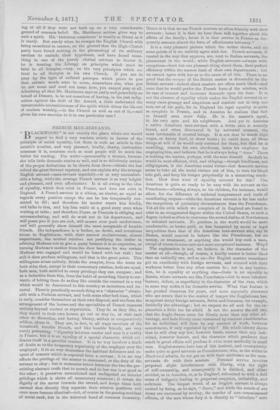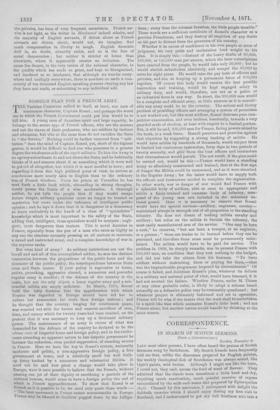FRENCH MEN-SERVANTS.
" BLACKWOOD " is not exactly the place where one would expect to find a very resolute article in favour of the principle of social equality, but there is such an article in this month's number, and very pleasant, kindly, chatty, instructive nonsense it is, nonsense such as most people will be much the better for reading. The writer—presumably a woman, because she tells little domestic stories so well, and is so deliciously certain of the proper deductions to be drawn from them—thinks she has solved the great Servant mystery, and can explain why the average English servant—man-servant especially—is so very uncomfort- able a being, while the average French servant is so very helpful and pleasant, and even affectionate. It is all owing to the idea of equality, which does exist in France, and does not exist in England. A French servant is a citizen, an elector, an equal as regards every position except the one he has temporarily con- sented to fill ; and therefore his master treats him kindly, and talks to him, and lets him smile at a good story even when waiting at table ; and therefore Pierre or Francois is obliging and accommodating, and will do work not in his department, and will nurse you if you are sick, will mourn over your misfortunes, and will generally show himself the most acceptable of humble friends. His independence is a bother, no doubt, and sometimes seems to Englishmen, with their narrow exclusiveness, almost impertinent, the mutual relation not justifying the butler in advising Madame not to give a party because it is so expensive, or turning Madame's mother from the door because he was certain Madame was engaged and would be bored with her visit ; but still it does produce willingness, aud that is the great point. This willingness arises entirely, thinks the essayist, from the sense on both sides that, except in their momentary relation, both are equal, both men, both entitled to every privilege they can compass ; and as a deduction from this, from the habit of according liberty to ser- vants, of letting them do as they like outside the contract in a way which would be denounced in this country as monstrous and im- moral. There is practically no such thing as a " character " obtain- able with a Parisian servant, and both sexes after bed-time, which is early, consider themselves at their own disposal, and are from the arrangement of the houses and the specialities of French manners entirely beyond control or supervision. They do as they like, as they would its their own houses, go out or stay in, or visit each other at discretion, and having liberty-, seldom or comparatively seldom, abuse it. They are, in fact, in all ways members of the household, humble friends, and like humble friends, are very rarely presuming. "Equality between master and man is a reality in France, but it is an equality of a special character, which evi- dences itself in a peculiar manner. It in no way involves a shade of doubt as to the temporary superiority of the employer over the employed ; it in no way diminishes the habitual deference and re- spect of manner which is expected from a servant ; it in no way affects the privilege of the master to command, or the duty of the servant to obey ; but it maintains intact between the two the pre- existing abstract truth that in morals and in law one is as good as the other ; it preserves unweakeued and undisputed an interior privilege which is above all momentary relations ; it covers the dignity of the server towards the served, and keeps them both assured that directly they separate their relative positions will once more become identical—not, of course in the passing accident of social rank, but in the uuiversal bond of common humanity.
Hence it is that we see French masters so often friendly with their servants ; hence it is that we hear them talk together about the affairs of the family ; hence it is that service in France so fre- quently assumes almost the form of affectionate intimacy."
It is a very pleasant picture which the writer draws, and on some points of it we entirely agree with her. French servants, if treated in the way they approve, are, next to Italian servants, the pleasantest in the world ; while English servants—always with exceptions—have but one pleasant thing about them, their perfect efficiency within the narrow limit of their own departments ; but
we cannot agree with her as to the cause of all this. There is no proof that the nuwfitte of the British master is distasteful to the
British servant—indeed silent masters are often much liked—and none that he would prefer the French form of the relation, with its ease of manner and incessant demands upon his time. It is not the absence of equality which makes the English servant in so many cases grumpy and suspicious and resolute not to step one inch out of his path, for in England his legal equality is quite as complete in France, and in America ho realizes that fact to himself even more fully. Ho is his master's equal, in his own eyes and his neighbours. And yet in America. a native Atnerican man-servant with a white skin is scarcely found, and when discovered is, by universal consent, the most intolerable of created beings. It is not that he wants high wages, or dainty food, or short hours ; he could have all those things at will if he would only contract for them, but that he is unwilling, resents his own obedience, hates his employer for employing hitn, and believes that he is always being "done." There is nothing the matter, perhaps, with the man himself. As clerk he would be most efficient, civil, and obliging—though kindliness, not obligingness, is the American social virtue—but domestic service seems to take all the social virtues out of him, to turn his blood into gall, and keep his temper perpetually in a simmering condi- tion. How does want of equality account for this ? The American is quite as ready to be easy with his servant as the Frenchman—allowing always, as his children, for instance, would allow, for the difference of national temperament and mode of manifesting respect—while the American servant is far less under the compulsion of pecuniary circumstances than the Frenchman. Yet all the evils which we complain of in England are found to exist in an exaggerated degree within the United States, to such a degree indeed as often to overcome the rooted dislike of Northerners to coloured servants. No position in the world would be more comfortable, or better paid, or less hampered by social or legal inequalities than that of the American man-servant who, say in Boston, would consent to behave like the Frenchman, but no money, or treatment, or anything else would buy such a man, except of course in some rare and most exceptional instance. Why?
The explanation is not, we believe, in the character of the master at all—though, of course, a kindly master is better liked than an unkindly one, and so on—for English masters sometimes get on excellently with foreign servants, and succeed with their workmen better than any other masters do ; nor in any institu- tion, be it equality or anything else—there is no equality in. Russia, where servants are like Frenchmen—but in some inherent feature, defect, or superfluity in the character of the race, which in some way unfits it for domestic service. What that feature is has puzzled observers for years, and more especially observers who are aware that in the matter of temper the Englishman has, as against many foreign servants, Swiss and Germans, for example, decidedly the advantage ; but we suspect we all seek for the ex- planation a little too far afield. Is not the answer the old one that the Anglo-Saxon cares for liberty more than any other ad- vantage, and feels liberty more restrained by constant consideration for an individual will than by any amount of work, however monotonous, if only regulated by rule ? His whole history shows that ho will obey any law, however harsh, sooner than any indi- vidual, however lenient, and the character which produces that result in great affairs will produce it even more markedly in small ones. Englishwomen have less of this instinct, and consequently make quite as good servants as Frenchwomen, who, as the writer in Blackwood admits, do not get on with their mistresses as the men- servants do with their masters. Personal service involves perpetual slight interferences with liberty, with the right of self-ownership, and consequently it is disliked, and either avoided, as in America, or, as mu England, submitted to with a dull souse of indignity leading to perpetual suspicion, irritability, and sulkiness. The deepest wrath of an English servant is always excited by being, as lie says, "drove," and while the annals of our Army are unstained by mutiny, the murder of non-commissioned officers, of the risen whose duty it is directly to " interfere " with the privates, has been of very frequent occurrence. French ser- vice is not light, as the writer in Blackwood indeed admits, and the majority of English servants, if driven about as French servants are driven about, would not, we imagine, find much compensation in liberty to laugh. English domestic drill is, no doubt, absurdly strict, and so is the line of social demarcation ; but neither is stricter at home than
elsewhere, where it apparently creates no irritation. The cause lies deeper, in the very centre of the national character, in the quality which has made us great, and kept us disorganized, and rendered us so intolerant, that although we wander every- where and multiply everywhere, there is nowhere on earth a com- munity of ten thousand English-speaking persons obeying any law they have not made, or submitting to any individual will.



































 Previous page
Previous page